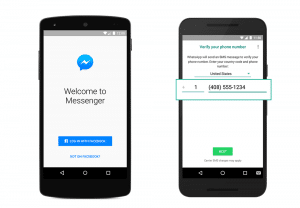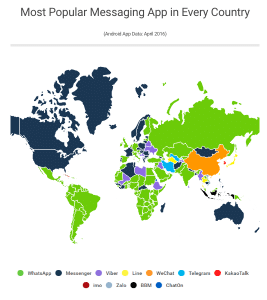WhatsApp currently has 1.3 billion montlhy active users worldwide, 9 million of which are in France according to Médiamétrie. Every day, these users exchange 55 billion messages – twice as many as are exchanged by SMS. Users also love using the app as a phone – to the tune of 100 million voice calls per day!

WhatsApp’s success can be attributed to its ease of use and the fact that it’s a free tool for communicating internationally as long as there’s a wi-fi or 3G/4G connection. Thanks to its messaging, voice calling, and group conversation features, the app has been widely embraced by users.
WhatsApp for business: testing has begun
In India (WhatsApp’s largest market, with 15% of its users), the enterprise app WhatsApp for Business is still in the testing phase. The API that will allow companies to adopt this channel should be available in 2017.
Some businesses are already using WhatsApp as a customer service channel by doing their own front-end development that lets them grab messages without an API. However, because this kind of hack is not officially authorized by WhatsApp, businesses risk losing their investment. WhatsApp has not officially released a business product, and could decide at any time to:
- block this traffic, cutting businesses off from WhatsApp messages
- change the technical interfaces or add new features during an update, which would require companies to rewrite or write new code
Update 30/08/2017 : WhatsApp has officially announced the launch of verified business accounts, currently limited to a small number of businesses participating in a pilot program. This is one more step towards the rollout of a program dedicated to businesses.
WhatsApp vs. Messenger: What are the differences?
We recently wrote about the benefits of messaging for customer care. Messenger and WhatsApp are two of the main applications you can adopt to capitalize on this trend. Companies already have the option to use the Messenger for Business app for customer care.
Although WhatsApp and Messenger are both owned by Facebook, there are some differences:
1. Registration process
Messenger lets users register in 2 different ways: with their phone number alone, or with their Facebook account, which requires more personal information.
WhatsApp requires only a phone number, which lets users get started very quickly. Registering with a phone number allows users to instantly find those of their contacts who have WhatsApp accounts. WhatsApp is more rooted in current mobile user behaviors, and is increasingly replacing traditional text messages.

2. Features
Both applications have many similar features: group conversations, file sharing, emojis, voice messages, and more. Messenger is developing additional features, such as games, payment, and geolocation, while WhatsApp continues to focus on essential features linked to messaging. With its plans to offer a business version of WhatsApp, however, Facebook is working on extending WhatsApp’s features and capitalizing its popularity.
There are also differences between the desktop interfaces of the two: Messenger’s interface is more complete than that of WhatsApp, which is more limited and less suited to this type of use.
3. Worldwide use
WhatsApp is very popular in some countries where mobile plans do not include unlimited SMS messages, while Messenger is more widely used in countries that have a high rate of Facebook use.

It should also be noted that, because Facebook owns the leading messaging apps in 84% of the countries studied by SimilarWeb, it is in Facebook’s interest to maintain the differences that made each of the two apps successful in order to reach the maximum possible number of users worldwide.
4. Privacy
When it comes to privacy, the encryption of conversations on WhatsApp remains an advantage compared to Messenger, since WhatsApp decided not to share its data with Facebook following the warning of the Article 29 Data Protection Working Party (European privacy regulators)
Our recommendations
Dimelo recommends waiting until the WhatsApp API is officially released for businesses. WhatsApp will then be easy to incorporate into the Dimelo Digital platform, which will enable companies to manage client interactions received through this channel in the same way they do other digital channels. With the API, companies will be able to interact with customers through WhatsApp with complete peace of mind.
Because Dimelo is an open platform, however, companies that do not wish to wait have the option to develop their own WhatsApp connector (internally or with the help of a third party), in which case they can then manage customer exchanges on Whats App through Dimelo Digital. It is possible to add channels that don’t have an API using our Source SDK, although there are some risks to this type of integration.
We can see that, based on Internet user behaviors and the ways platforms are evolving, the major customer care trend at the moment is messaging. Communicating via WhatsApp will allow brands to truly adapt to their customers’ behaviors by adopting the same communication method that they use with their friends and family. Like WeChat, WhatsApp could also ultimately evolve into much more than a messaging app to encompass multiple functions, such as shopping and payment. In order to capitalize on the popularity of this channel, it is therefore essential for brands to adopt WhatsApp as soon as its enterprise service is available.
Originally published Apr 24, 2017, updated Aug 11, 2020





